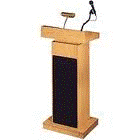
Discipline-Based Education Research Group Speaker Series
Date of this Version
2-12-2015
Document Type
Presentation
Citation
DBER Group Discussion on 2015‐02‐12
Abstract
This research focused on skeptical climate change literature designed for children and parents. The purpose of the research was to explore how these pseudo‐educational materials convey a logic of nonproblematicity about climate change (McCright & Dunlap, 2000). Using rhetorical analyses procedures developed from previous excavations in skeptical discourses, this study identified: (a) common forms of climate skepticism, (b) frames for climate change policy making, (c) areas of contested scientific knowledge, and (d) appeals for managing the uncertainty of climate change. The results suggest that the logic of non‐problematicity about environmental problems is bolstered by contradictory forms of climate change skepticism and polarizing social‐conflict frames. Dominant narratives of ecological modernization and appeals to independent decision‐making are employed as brokering‐devices to reinforce apathy and inaction in the public sphere. This research study contributes to environmental communication scholarship concerned with increasing climate denial media campaigns targeted for educational contexts.
Included in
Curriculum and Social Inquiry Commons, Educational Methods Commons, Science and Mathematics Education Commons


Comments
Copyright (c) 2015 Julie Thomas